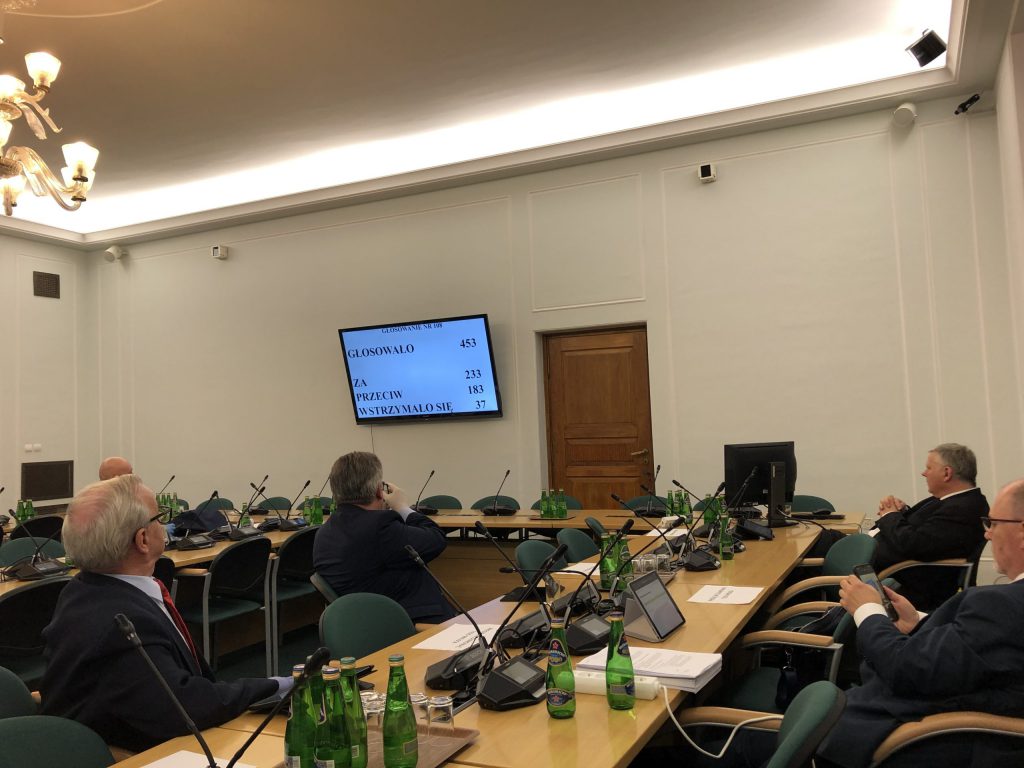On 15-16 April 2020, the 10th session of the Polish Sejm was held
Most important item on the agenda was Consideration of Senate amendments to the so-called Crisis Shield 2.0. Law on Special Support Instruments in Relation to the Spread of SARS-CoV-2 Virus defines the principles, conditions and mode of offering entrepreneurs the support necessary to maintain and continue their business activities. It is intended to mitigate the economic impact of prohibitions and restrictions enacted to prevent, address, and combat the infection and spread of the SARS-CoV-2 virus (COVID-19). Adopted The regulation includes exemption from social security contributions also for companies employing up to 49 people, not only micro companies as it was the case until now. They will be able to count on the 50% relief for three months in social insurance premiums. The regulations will also cover those employed under civil law contracts. For three months the so-called parking allowance will be paid (currently it is a one-time payment).

Support for business will be granted by the Industrial Development Agency based on an application submitted by the entrepreneur. The aim is to counteracting the economic effects of COVID-19 by providing the beneficiaries with financial liquidity for the duration of the epidemic emergency or epidemic state and for 12 months after its cancellation, until the negative economic effects cease. According to the Act, support will be granted in particular in the form of loans, guarantees or sureties, and leasing, and applications for assistance will be available online. The application form and explanations on how to complete and submit it can be found on the ARP SA website.
The Senate proposed 95 amendments to the Anti-Crisis Shield. Almost half of them, 45, were adopted by the Sejm. The Sejm accepted the Senate's proposal that companies established between February 1 and April 1, 2020 could also benefit from the aid provided by the bill. The Sejm also supported the amendment providing for exemption from Social Security contributions for all sole proprietorships, regardless of their income. Approval was also given to a Senate amendment providing that during a state of emergency or epidemic the local government bodies and the executive bodies of local government units acting collectively will be able to meet remotely. The law has already been signed by the President.
The parliament also passed the "Pregnancy Plus" program, which aims to ensure that all pregnant women have access to free medicines. This is an amendment to the law on publicly funded health care services and certain other laws, which provides that medications will be eligible from the time the pregnancy is established, regardless of the path of conception, until the end of the pregnancy (delivery). Medicines used during childbirth and the puerperium are included in the scope of guaranteed benefits and will be financed on the current basis. The bill will now go to the Senate for debate.
The fate of four civic bills was also decided. After the first reading they were all sent for further work in parliamentary committees.
- Proposed amendments to the Hunting Law, allowing - with the consent of parents or legal guardians - the participation in hunting of children and adolescents under 18 years of age to the Committee on Environmental Protection, Natural Resources and Forestry.
- The Citizens' Bill on the Protection of Property in the Republic of Poland against Claims of Property Without Heirs has been referred to the Parliamentary Committee on Justice and Human Rights.
- The Extraordinary Committee for Amendments to the Codifications will consider a draft amendment to the Criminal Code submitted by a group of citizens, providing for criminal penalties for public advocacy or approval of minors engaging in sexual intercourse.
- The civic project abolishing the possibility of termination of pregnancy in a situation of a high probability of severe and irreversible fetal disability or incurable disease threatening its life was referred to the committees: Health and Social Policy and Family.
In addition, MPs heard current information on the functioning of fire schools during the coronavirus outbreak, with particular emphasis on the situation in the Main School of Fire Service in Warsaw. The presentation of information was requested by the Coalition Parliamentary Club of the Left. On the part of the government, the explanations were given by Mariusz Kamiński, Minister of Internal Affairs and Administration. He informed the MPs and the public opinion that since 12 March all schools subordinate to the Ministry of Internal Affairs and Administration have suspended classes. He also indicated that students and cadets remained in SGSP and in other firefighting schools because they have their own rescue and firefighting units with designated protected areas.
Members of the Council of Ministers also answered questions on current affairs. These included:
- thirteenth pension. The Deputy Minister of Family, Labour and Social Policy, Stanisław Szwed, explained that there is no threat to the payment of this benefit. He emphasized that funds for this purpose are ensured in this year's budget. There are also no plans to liquidate this benefit in the coming years.
- Minister Marlena Maląg, the head of this department, answered questions concerning, among others, the situation in social welfare homes. She explained that since the outbreak of the pandemic the government has been supporting local governments in the implementation of their own task, which is social care. She recalled that local governments run 824 social welfare homes in Poland, and the government gathers information on the needs of these facilities on an ongoing basis and assists in their implementation.
- Deputy Prime Minister and Minister of Culture and National Heritage Piotr Gliński answered questions on support for cultural institutions. He informed that the value of the support under preparation aimed at compensating for losses related to the suspension of the cultural sector is about 4 billion PLN. He reminded that this year's budget for culture is about 5.25 billion zlotys, and back in 2015 it was 3.6 billion zlotys.
Pros: www.Sejm.gov.pl


